Lab, Field or Office?
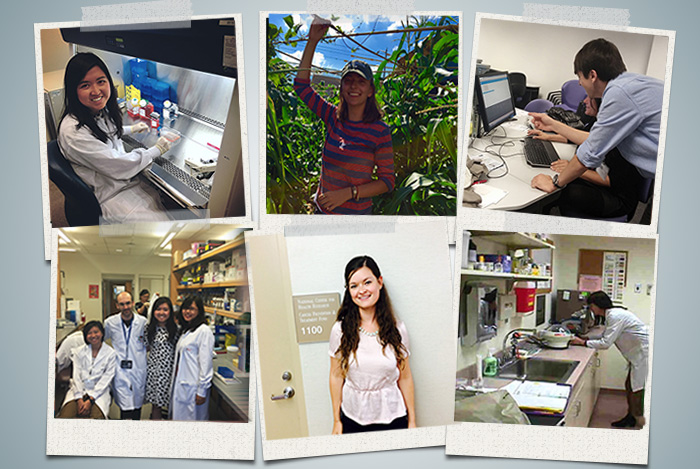
Summer interns ‘do science’ in different settings and ways
by MaryAlice Bitts-Jackson
Can you envision a career that would take you outdoors every day? Or maybe you’d rather embark on space travel or perform cutting-edge research in a lab. Perhaps you dream of working in a medical facility. Or, if an office job is more your speed, there are public-health programs and environmental projects to manage, science articles to write and more.
If you love science, you can follow all of these career tracks (and many more). The best way to figure out what you'd like best? Internships! Five students, representing five majors, share what they learned through their 2015 summer internships.
Su Yadana ’16: Duke University-National University of Singapore
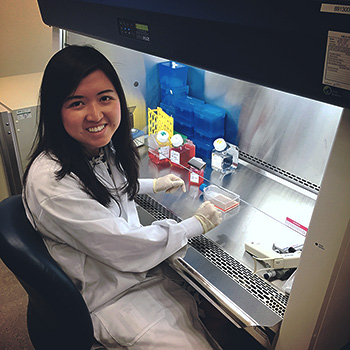
Major: Neuroscience (health-studies certificate)
How did you get this internship?
I emailed the head of the Emerging Infectious Diseases Research Department at Duke-NUS, Duke University’s medical school in Singapore. One of the researchers, Dr. St. John, [invited me to] come and work in her lab.
What do you do on a day-to-day basis?
I worked closely with an M.D./Ph.D. student researching the Japanese encephalitis virus and its pathology in different organs. During the first two weeks, I observed him as he conducted experiments. After that, I worked independently, performing experiments to figure how much of the virus was present in different organs, post-infection, in mice.
What is the most valuable part of your internship?
Having a chance to work in a real lab and being exposed to (and getting a chance to do) different research techniques, like beta-hexosaminidase, ELISA, real-time PCR, tissue sectioning and immunohistochemistry.
What advice would you give to students interested in an internship?
Internships are a great way to preview a career. If you are offered an internship that is outside of your interest (for example, my major is neuroscience, and my internship focused on cell and molecular biology), you should give it a try. You might find yourself a new career interest.
Lea Simms ’16: National Center for Health Research
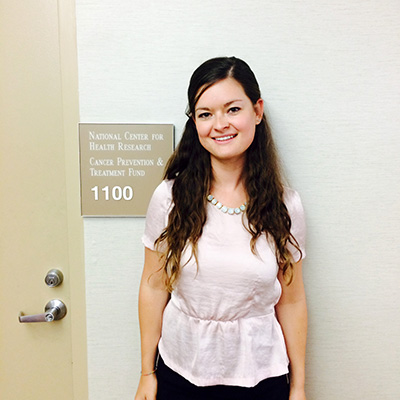
Major: Psychology (health-studies certificate).
What do you do on a day-to-day basis?
Some days are very research-heavy: I compile data, read and write articles and help the senior fellows with various projects.
Some days are more communication-focused: I update the website and maintain our social media presence. A couple times a week I go to health-related briefings, often on Capitol Hill, or watch seminars.
Have you had previous internships?
After my freshman year I interned at Western Psychiatric Institute and Clinic, a psychiatric facility in Pittsburgh. Last summer I interned with a nonprofit called SOME (So Others Might Eat).
What is the most valuable part of this internship?
All of my past internships were very hands-on, and this summer I am working in an office and learning more about the policy side of health. I am realizing that is the side of public health that I am interested in.
Cheyenne Moore ’18: USDA Forest Service
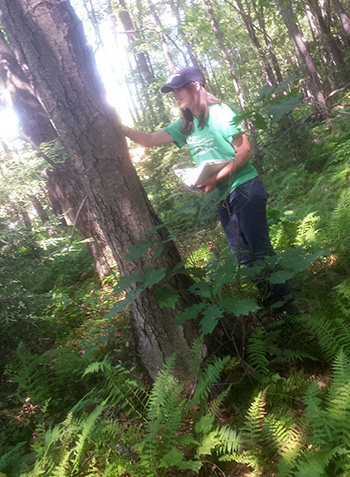
Biology.
How did you get this internship?
Through a family friend, who knows my [internship] supervisor. I reached out to my supervisor, asking if he knew of any internships I might qualify for. He looked over my resume and offered me a position. It's unpaid, but it offers great experience.
What do you do on a day-to-day basis?
I collect and record data for the USDA Forest Service. [The Forest Service has] plots [of land] all over the country, from which data is collected every five years. On each plot there are four circles—each has a 24-foot radius—and all trees in the circles are measured. Typical measurements include diameter, tree class, tree grade, crown class, crown ratio, height and damages.
What is the most valuable part of this internship?
I've increased my knowledge of plant identification. Also, being in the field has allowed me to witness ecosystem relationships and formulate my own research questions.
What are your post-Dickinson plans/hopes/dreams?
I hope to be an environmental biologist. I love Central Pennsylvania, and I want to work here in an effort to preserve the natural ecosystem. I have learned a lot about invasive species during this internship and hope to do research with them. I also have loved working in the Allegheny National Forest.
Miranda Lachman ’17: Edible Schoolyard NYC and Slow Food USA
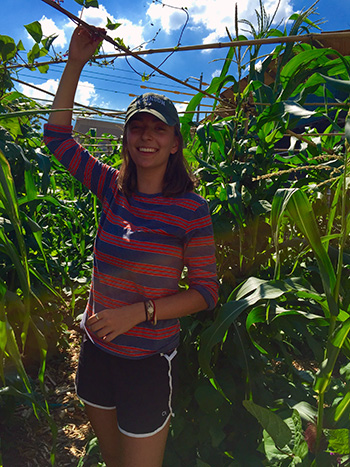
Major: Environmental studies (health-studies certificate).
How did you get these internships?
I am interested in sustainable agriculture, and I looked into a handful of food-related organizations with internship programs in New York City. Edible Schoolyard and Slow Food were the two places that got back to me the fastest and were the most enthusiastic about hiring me.
What do you do on a day-to-day basis?
At Edible Schoolyard I help maintain a one-acre garden at a public school in Brooklyn, N.Y. Every day is different, and I have a lot of freedom to choose what I want to work on. There are some big, ongoing tasks, like turning and mixing compost and tending to a large patch of the three sisters (corn, beans and squash). I also help prepare for special events, and the other intern and I usually run the volunteer days, which is a wonderful teaching experience. When school was still in session, I helped out occasionally with garden and kitchen classes.
At Slow Food I am the intern for a biodiversity campaign, Ark of Taste. The Ark is a database of fruits, vegetables, animals and foods that are going extinct or are greatly underappreciated. Ark of Taste provides a place where producers can showcase these products. I do research on the nominations that have recently been added to the Ark, and I write little blurbs about each one for the Slow Food website. I have also learned basic coding, so I can update the website when necessary. I am writing a series of blog posts on various campaigns, including Slow Cheese and Slow Wine. This aspect of my internship is great, because I can incorporate some of what I’ve learned as an environmental-studies major.
Have you had any other internships?
Last summer I worked on two separate organic farms—one in France and the other, in Spain.
What is the most valuable part of this internship?
I have so many ideas about what I want to do after college, and it has been great to explore these interests at two very different organizations. I can now use these experiences as reference points when figuring out what I want to do after I graduate.
Frank Vitale ’16: Zooniverse
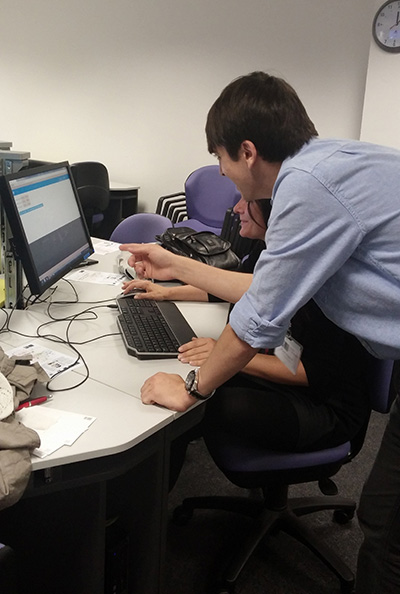
Frank Vitale '16 at Zooniverse, a platform for collaborative research.
Major: History.
How did you get this internship?
While studying abroad in Oxford, I went to an event sponsored by the university’s Museum of the History of Science about citizen science in the 19th and 21st centuries. One of the presentations that day was about crowdsourcing and the citizen-science projects run by Zooniverse [a platform for collaborative research]. After striking up a conversation over coffee with the presenter (now my internship supervisor), she suggested that a summer internship might be possible.
What do you do on a day-to-day basis?
My day-to-day routine varies significantly; last week, I was helping my supervisor run a workshop on building crowdsourcing projects at the Digital Humanities at Oxford Summer School. Aside from that, I spend most of my time working with the Science Gossip project, engaging with the volunteer community. I also frequently do preparation work for projects that are about to launch, and I help come up with ways to analyze data collected from Zooniverse’s other projects.
Previous internships:
I have interned quite a bit in the past, including a summer working with the Carlisle Indian School Digital Resource Center at Dickinson’s Archives & Special Collections, as well as a Junior Fellowship at the Library of Congress last year.
What advice would you offer to peers considering an internship?
Do not be afraid to send emails, shake hands or knock on doors to learn more about your field of interest! Networking is a powerful tool that can help you discover new possibilities and narrow down your choices, and you can make good friends in the process.
Learn more about Vitale in "Days of Future Past."
Learn more
Published August 14, 2015